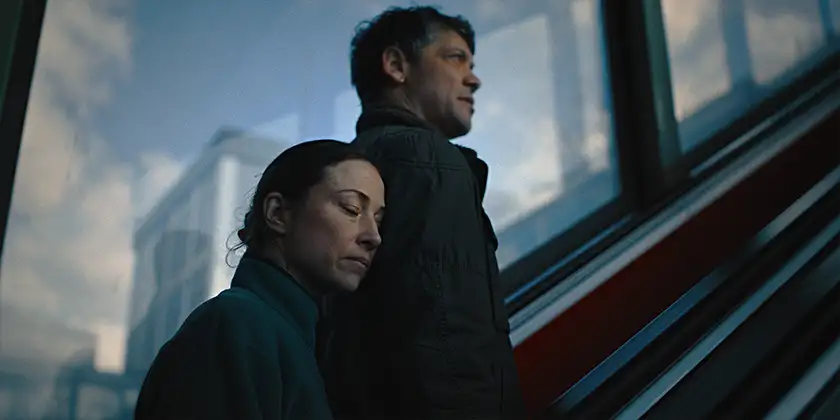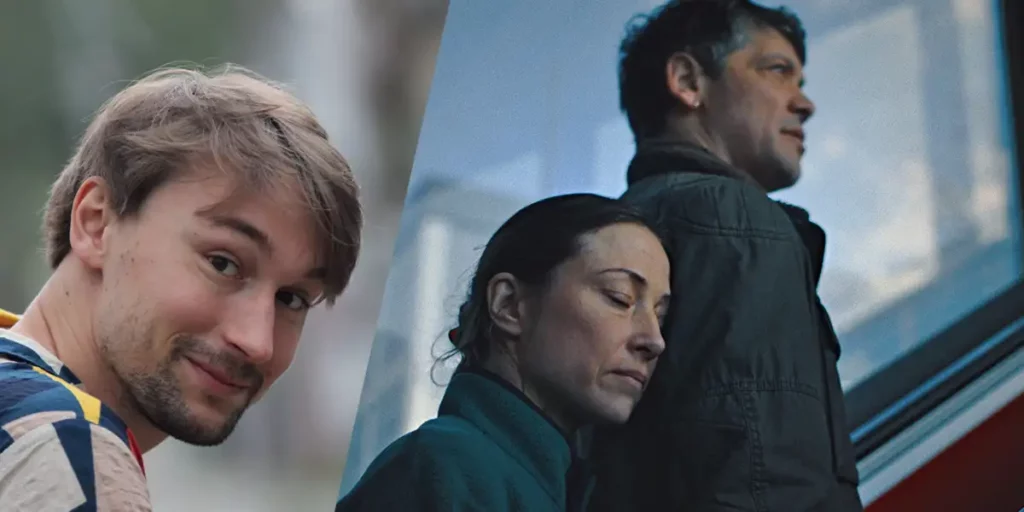We interview writer-director Michael Fetter Nathansky about his film Every You Every Me (Alle Die Du Bist), a creative examination of relationship dynamics.
Writer-director Michael Fetter Nathansky (You Tell Me) brings his second feature, Every You Every Me (Alle Die Du Bist), to the Berlinale, where we sat down with him for an interview. The film is mainly told from the perspective of a woman named Nadine (Aenne Schwarz), who has known for quite some time that she’s falling out of love with her husband and yet can’t bring herself to face the truth. But the most interesting aspect about the movie is its creative visual approach, as Nadine’s husband is portrayed by different actors – and an animal! – depending on the shifting dynamics in the relationship.
When we first meet Paul, he is having an anxiety attack and Nadine is trying to soothe him: that’s why he appears to us in the form of a cow. Later on, we see him as a little child (Sammy Schrein) who acts purely on instinct, as a young man (Youness Aabbaz) whom she finds attractive, as an old lady (Jule Nebel-Linnenbaum) who becomes a mother to. Nadine, and, finally, as what he looks like to the outside world (Carlo Ljubek). During the film, we follow our central couple as they navigate their relationship, made even more complex by them having children – Mica (Naila Schuberth) and Eleni. But we also get flashbacks of their first meeting, as co-workers in a factory, and glimpses of the struggles they’re currently having at works.
At the 2024 Berlin Film Festival, we speak with Michael Fetter Nathansky about his approach to Every You Every Me (Alle Die Du Bist)’s story, making the movie, working with Aenne Schwarz and the rest of the cast, and more. Read the interview below!
The Central Relationship in Every You Every Me
It’s so interesting how you showed so many different versions of Paul within the relationship, and how you had various actors portraying him. Who do all of these versions represent?
Michael Fetter Nathansky: It was really important to me to show a relationship that isn’t just made of words, or sad looks through the window, and how they “don’t know each other anymore.” I wanted to give it everything that cinema can offer, and everything that our bodies can offer too.
Of course, it’s easy to analyse the first level: there are times when we all feel vulnerable and childish, in a way. Sometimes we feel like we can comfort others and we are the strong ones, or we see another person being strong. There’s the erotic, romantic way with the young Paul. And then there’s this animal way, which is just so corporal – of course, not in a erotic way, but there are senses involved, like the sense of smell. For example, I tend to massage my girlfriend’s hair a lot, and even if we don’t talk about it, it’s part of our relationship, and of how we see each other.
But while I was writing the film, I also wanted to have some kind of mystery to all these characters. It’s not like mathematics, you know? “Now we have the boy, now we have the car,” now we have everything on the list of psychology. I wanted to have space to find these characters during shooting.

You mentioned the sense of smell. It feels like the senses – not just smell, but also touch, like the very first time we meet Paul – are so important in the film.
M.F.N.: When the whole relationship like falls apart, it’s in every sense: in the in the intellectual sense, in terms of the heart of it, but also in the corporal sense, because Nadine is losing the interest in him. But [if this sensorial aspect of the film works], it’s not just because of the shots, but also of Aenne Schwarz’s performance. She was the one who had to deal with the physicality of the role, and with all the different characters, and she was just amazing. So she also inspired me to write the script, in that way.
The scene you mention, about the sense of smell, is one of my favorite scenes in the film. Nadine tells Paul that he stinks, and at first he disagrees, then he looks at himself in the mirror and he can suddenly smell it too.
M.F.N.: That’s the dependency that comes when you’re in a relationship: I tell you who you are, and you tell me who I am, and when those things don’t match anymore, things can fall apart. It’s the vulnerability that comes with being in a relationship: the moment someone tells you that they don’t like your smell anymore, I would think, “oh my god, who am I? I don’t know anymore”. Being able to show all this was a challenge, particularly in editing it, but it was more of a joy. I also saw it as an experiment: I didn’t know if it would all work, as I was writing the film, but I wanted to try.
Michael Fetter Nathansky on Working with Aenne Schwarz and the Cast of the Film
Did you have a very strict script that the cast had to follow, or was there room for improvisation as you were shooting the film?
Michael Fetter Nathansky: I have a script when it comes to the dialogues. Aenne Schwarz always describes it as being both authentic and cinematic: the way the characters speak is a bit like theatre, but there’s also this working class context. But then, when you work with a cow, it’s like… Okay, Nadine, now it’s your job! [laughs] and I will try to not have you get hurt, but you are the one who’s doing the interaction. Aenne Schwarz always tries to get everything she can out of every scene. When she plays with the children, she was really there for them too. So, in a way, the most important directing decision was just casting Aenne: she’s the one who combines all the roles, and it’s her love for everybody’s roles that makes Paul into a role, much more than all the other Pauls make each other into the role, know what I mean?
Aenne Schwarz is amazing in the film. There’s this empty gaze that she has, when it looks like she’s looking at someone, but she’s actually looking through them. Even her co-worker Ajda (Sara Fazilat) calls her out on that when they’ve just met.
M.F.N.: That was very important to me. We all know that sometimes we just look through people, and we don’t really look at them. Maybe we’re lost in our owh thoughts, maybe we’re sad, or whatever. I didn’t give her a tool to achieve this looks, because it’s just what Aenne brought with her. It’s part of her own secrets, or mysteries, that she has. When I saw her in other films, she always touched me, even in very short scenes: it’s something I really can’t explain, but I really wanted to work with these eyes. I knew the eyes would be the most important thing in the film – even more important than the changes in Paul’s appearance.
Why did you decide to cast Jule Nebel-Linnenbaum as one of the Pauls? I loved that all the other versions of the character are men, but that when he’s being more maternal to Nadine, he’s played by a woman.
M.F.N.: I think that in relationships, sometimes we are women and sometimes we are men: it doesn’t have to be so clear. In a way, all these versions of Paul are things that I have a connection to. My mother was a farmer, so that’s why I like cows much more than horses, or dogs. Jule Nebel-Linnenbaum is actually my girlfriend’s mother. She’s not an actress, and that was her first role: that’s just it. I wanted to have an older woman who was caring, but not like a super sweet grandma: she needed to be practical too. My girlfriend’s mother is just like that, so I thought, why not try?
The Central Theme of Every You Every Me and What Inspired the Film
There’s a key scene in the film, when Nadine confides in her co-worker Ajda, and asks, “Do you know the feeling when you look at a stranger and find it odd, how he talks and what he says, and after a while you realize that it’s your husband?” That scene sums up the entire film to me.
Michael Fetter Nathansky: In my own life, I’ve experienced some situations with people who were very close to me, when I looked at them and I was just like, “who are you? I don’t know you.” It’s what I imagine “emotional” Alzheimer’s to be like, and that really scared me. As a filmmaker, you take the things that scare you and you make them bigger, and you search for them, and you start to get more and more questions, and then you end up making something like this.
Was that the starting point for you, when you decided to make the film?
M.F.N.: It was partly that, but there were also other reasons. This idea of playing with different characters was always there, but I was always bored of this idea, because I didn’t know how many versions of the same character I wanted to have, and what kind of story I wanted to tell. But then, at one point, I felt that it would be much more interesting if these versions reflected the perspective of a woman. What does it say about her? What does she want to see? What are her desires, her fears, and her longings? And why does she see these persons? That was the moment when I felt that this could be interesting.
Michael Fetter Nathansky on Every You Every Me‘s Berlinale Premiere
What does it feel like to bring Every You Every Me to the Berlin Film Festival?
Michael Fetter Nathansky: It’s beautiful! I live here, and one of my first short films [Gabi] premiered here seven years ago. The premiere was so nice, because all our friends and family could come and we had a great slot: Friday night at Zoo Palast, which is a big cinema. I’m also like Nadine: sometimes I’m not really there in the moment, so I’m still processing it all.
Thank you for speaking to us!
This interview was edited for length and clarity.
Every You Every Me premiered at the 2024 Berlin Film Festival. Read our review of Every You Every Me.

